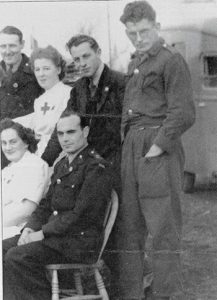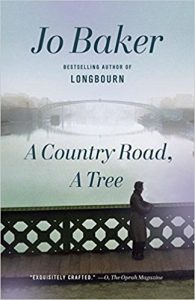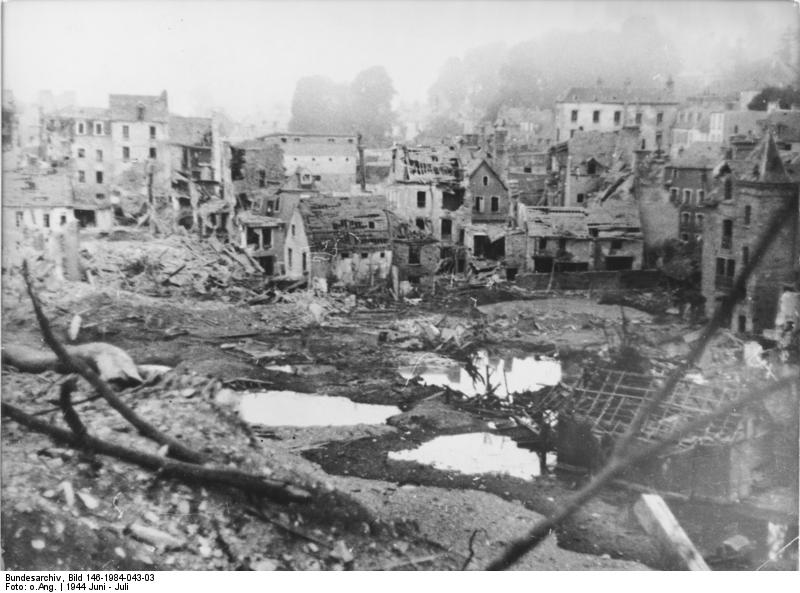Alan Morris
University of Strathclyde
In her much-lauded, best-selling novel of 2013, Longbourn,[1] Jo Baker cleverly rewrote Jane Austen’s Pride and Prejudice from the point of view of the servants, and thereby proved that she had a particular talent for historical fiction. Her follow-up work, A Country Road, A Tree, demonstrates that she has lost none of her skill, for although the protagonist of this new text is never named, he is clearly based on Samuel Beckett (1906-89) who was to win the Nobel Prize for Literature in 1969.[2]
Baker’s tale is not, however, a fictionalisation of Beckett’s entire life, or even his entire literary career. It begins in Spring 1919, in his family home in Ireland. Here, the young Samuel climbs a tree and attempts to “join the clouds” (p. 13), falls to earth before trying again. These actions serve, partly symbolically, to establish some key attributes of Beckett that emerge later: his determination to choose “Always the hardest path. Always the highest tree” (p. 329), and his absolute need to “fly” (p. 13). After this prefatory section, the novel skips the next twenty years, contenting itself with the occasional, retrospective “drip-feeding” of (unexplained) biographical details from this period, for it is Beckett’s life from September 1939 to January 1946 that is the focal point of the book. Baker has thoroughly researched her topic,[3] to ensure that “the fiction doesn’t take over from the facts,”[4] and her portrayal of Beckett is empathetic. He is viewed as a man of uncertain identity (emphasised by his being unnamed); a man who is regularly told, and constantly feels, that he is useless; and a man with some fascinating relationships. Readers discover his strong bond to his deceased father and the overbearing nature of his mother, as well as the impact of the two other pivotal people in his life: his lover, Suzanne, and “Shem” (James Joyce). He had been his secretary and worshipped him, but his influence had led him astray.

Figures 1a and b: Beckett, his brother Frank, and Suzanne Dechevaux-Dumesnil, Emory Magazine Winter 2012; James Joyce.
Underpinning the depiction of Beckett is the significance of his adventures between 1939 and 1946. Faced with “a series of extraordinary moral choices,” Baker herself remarks, he “consistently turned towards what was most decent and compassionate and courageous. He chose to face the war with his friends in France, rather than sit it out in neutral Eire. He chose to give his subsistence-level rations away to those in still greater need. He chose to resist. […] And then, after the devastation, he chose to aid with the rebuilding.”[5] Beckett would, in fact, be decorated by the French for his work in the resistance.[6] In 1941 he joined a network in Paris that was betrayed, and then, after escaping to the south of France, joined the local maquis. As for the “aid with the rebuilding” to which Baker refers, this relates to his work in a flattened Saint-Lô, helping to construct a much-needed hospital.
 As the story of Beckett’s war progresses, a potted history of France from 1939 to 1945 unfolds, and many of the important events of the time are acknowledged, albeit generally only in passing. Where Baker excels, however, is in immersing her readers in the atmosphere of the time. Accompanying Samuel, we witness the consequences of rationing: the interminable queues; the vehicles running on gas, wood, or old cooking oil; and the thriving black market, where the wealthy lack for nothing. More troublingly, we are privy to the constant surveillance and repression: the curfew, the repeated identity checks, the arrests, the mass round-ups, and the incessant fear of knowing that “Even the slightest out-of-the ordinary occurrence is questionable now” (pp. 173-74).
As the story of Beckett’s war progresses, a potted history of France from 1939 to 1945 unfolds, and many of the important events of the time are acknowledged, albeit generally only in passing. Where Baker excels, however, is in immersing her readers in the atmosphere of the time. Accompanying Samuel, we witness the consequences of rationing: the interminable queues; the vehicles running on gas, wood, or old cooking oil; and the thriving black market, where the wealthy lack for nothing. More troublingly, we are privy to the constant surveillance and repression: the curfew, the repeated identity checks, the arrests, the mass round-ups, and the incessant fear of knowing that “Even the slightest out-of-the ordinary occurrence is questionable now” (pp. 173-74).
We can observe the various reactions to the war and occupation. Attentisme, “the politics of passivity” (p. 259), is the choice of the majority. For others, collaboration is preferable, whether this takes the form of casual prejudice, deliberate denunciation/betrayal, or the oppression of Communists and Jews by the French police. On the opposite front, and at much greater length, we become acquainted with the Resistance. This might involve simply listening to Radio Londres, or providing vital “safe houses,” like the couple who hide Beckett under their floorboards. Alternatively, the commitment — like Beckett’s — could be much more active, and hence require false papers, aliases, an ability to think on one’s feet, and a readiness to flee instantly whenever necessary. Not that people’s positions are always this clear-cut. Baker does not neglect the moral ambiguity of the period: Beckett’s Parisian network is betrayed by a priest, and a Resister says that his day job is printing the “devilry” of his enemies (p. 188).
In this way, and because we often see events from inside the characters’ heads, we get an intimate grasp of what the Occupation was like “at street level.” This is history from below, and all the more revealing for it. Indeed, explaining why she read novels as part of her extensive research, Baker asserted: “fiction is often brilliant for historical detail that might otherwise not be available,”[7] and this is certainly true of her own book. Details pepper the work, informing us of wartime experience. For instance, we learn its effects on the human body: the premature ageing, and that “new downy hair is growing on slack skin. Fleshless, the body insulates itself against the cold” (p. 157). We additionally learn of unheralded acts of resistance, such as inscribing Vive la France on a banknote, or checking mail in the Post Office to weed out denunciations. There is recognition, too, that, by the time of the Liberation, the Wehrmacht was not what it had been, what with its captured Russian or Polish recruits, and “boys who should not have had to be soldiers, […] old men who should not have had to be soldiers again” (p. 349). Nor — in another illustration of moral ambiguity — are the Germans all despicable monsters. Beckett befriends a POW whose hometown has been razed, and whose family and friends no longer reply to his letters.
Because she is a novelist and not a professional historian, Baker even offers an illuminating slant on well-known facts. With a pithy expression here, a striking metaphor or simile there, she manages a dazzling repackaging of the familiar. Witness this mere handful of examples: “the card-carrying communists have been interned for carrying their cards” (p. 51); “Rationing quite quickly becomes abstract: it doesn’t really matter what your share of nothing is” (p. 108); “Death itself has become contagious; they could catch it here themselves” (p. 312); or, much more evocatively: “The street is a void, as though people have dripped through the gaps between the cobbles and oozed into the cracks between the paving stones” (p. 133).
There is thus much for historians of the Occupation in A Country Road, A Tree. But there is just as much, if not more, for those interested in Beckett’s writing. Baker’s contention is that the war “mark[ed] a major change in Beckett’s work: […] those years in Occupied France seem to have established many of the key themes, images and preoccupations of Beckett’s later work.”[8] In short, his wartime wandering corresponds to a mental and emotional journey, and his experiences ultimately feed into his œuvre. Of these formative experiences the most significant are those that will foster a pessimistic world-view: his own suffering and hardship; his encounters with others who, like him, resemble his future characters, “battered, persecuted […], scraping by in the margins of a hostile world;”[9] and his life in the post-apocalyptic rubble of a bomb-flattened Saint-Lô, all of which instil in him such Absurdist first principles as the transience and randomness of existence, and the hopelessness of a universe ruled, at best, by “an outraged, vengeful God” (p. 333).
Beckett’s epiphany comes in Ireland, in 1945. There, in the blackness of his mother’s bedroom, he sees his reflection and realises that: “The world is not and never was in sympathy with him, nor with anybody else. But this is the moment […] the wide chaotic chatter and stink of it, all that wild Shem-beloved hubbub, falls away, and his eyes are trained on the darkness and his ears on silence. On that stark figure, framed there on the threshold. […] He can find his own way now, in the dark. He doesn’t need the light” (p. 341). The symbolism of this description — the light and dark, the threshold — is evident, and it is consolidated later to emphasise his parting of ways with the author of Finnegan’s Wake. Up until this point, “Shem” had exerted an overbearing influence on Beckett, as signalled by the hand-me-down coat he gives him. But now, when Samuel returns to France, the garment is left behind. He has divested himself of the Joycean mantle.[10]
The importance of this development is conveyed by the very structure of the novel. Part One, which runs from September 1939 to Beckett and Suzanne’s escape from Paris in August 1942, is entitled “The End.” Part Two, which details the couple’s trek south and their stay in Roussillon, is called “Purgatory.” The concluding Part Three (Summer 1945 to January 1946) — significantly after the Liberation — is “Beginning.” To highlight this, the narrative itself presents a number of fresh departures. The hospital at Saint-Lô emerges from the rubble, and Samuel tries to rebuild his relationship with Suzanne. But the most telling creative advance concerns Beckett’s writing. At the close of the novel, “The cupboard at the back of his mind is ready to burst open, and all the mess that has been shoved in there will spill out on to the floor” (p. 385). This “mess” is largely the Dantean “Purgatory” of Part Two, the torment of existence, its darkness, symbolised now by his painful scar as he climbs the stairs “into the shadows” (p. 387). By the final sentences, Beckett is writing, and he is on his way to literary glory: “This is where it begins” (p. 387).
 Baker does not, however, simply describe Beckett’s maturing into a world-renowned author. To show that his writing is, as it were, already “present” in his wartime experiences, she cleverly infuses her novel with echoes of his future classics, and especially En attendant Godot (Waiting for Godot). It is specifically Godot that is welling up inside him in Saint-Lô: “The images start to spill. He’s lost: the broken boots, the stiffening limbs, the sun sinking, rising, sinking; a country road, a tree” (p. 357). “A country road, a tree.” These words — the title, and hence the beginning, of the novel that we are reading — are the opening stage directions of the famous drama to come. Little wonder, therefore, that nods to Godot permeate Baker’s pages: Beckett is hidden under floorboards with an unkempt Russian who “helps to pass the time” (p. 173); on the road south, he and Suzanne find themselves “living hand-to-mouth on filched turnips and carrots and sleeping in hayricks” (p. 241); and in post-war Ireland, “he feels shambolic. A broken-down old tramp” (p. 336).
Baker does not, however, simply describe Beckett’s maturing into a world-renowned author. To show that his writing is, as it were, already “present” in his wartime experiences, she cleverly infuses her novel with echoes of his future classics, and especially En attendant Godot (Waiting for Godot). It is specifically Godot that is welling up inside him in Saint-Lô: “The images start to spill. He’s lost: the broken boots, the stiffening limbs, the sun sinking, rising, sinking; a country road, a tree” (p. 357). “A country road, a tree.” These words — the title, and hence the beginning, of the novel that we are reading — are the opening stage directions of the famous drama to come. Little wonder, therefore, that nods to Godot permeate Baker’s pages: Beckett is hidden under floorboards with an unkempt Russian who “helps to pass the time” (p. 173); on the road south, he and Suzanne find themselves “living hand-to-mouth on filched turnips and carrots and sleeping in hayricks” (p. 241); and in post-war Ireland, “he feels shambolic. A broken-down old tramp” (p. 336).
Besides the characters in Godot, other passages evoke the major concerns of the play. Life is exhausting. “Just the bare essentials take up so much of one’s time and energy” (p. 119). Indeed, Time is a recurring theme. Watches are consulted and clocks strike the hours, but often, “Time ticks […]. Nothing happens” (p. 200).[11] The characters are trapped in Time, “ticking on” (p. 183), constantly waiting. As in Godot, this prompts a number of philosophical reflexions — for example on whether it would be better to “just give up” (p. 256)— and language becomes a principal theme. Beckett knows, as a Resister, that patterns and meanings can be found everywhere: in the fragmented intelligence he collates and analyses, “the gnomic messages on Radio Londres” (p. 267), or the strange lights that flash in the night. His attempt to rewrite Molloy in French foregrounds the notion of translation, a notion whose intricacies are conveyed by Baker’s own, deliberately literal renderings of Gallic expressions (“Oh, the cow!”). But most importantly of all, language fills the emptiness, as when the German POWs “talk amongst themselves while they work, and it feels much better than that exhausted silence” (p. 350).
 Baker’s style similarly mirrors that of Waiting for Godot. The symbolism that many have found in Beckett’s play is fully evident here, as already illustrated above. There is additionally a strong sense of circularity, largely because of the host of leitmotifs: like the chafing, worn-out footwear and the sucking pebble. Even more intertextually, whole episodes from Godot are lifted and exploited afresh, most blatantly when Beckett and Suzanne are trying to cross the Demarcation Line separating German-controlled France from the unoccupied zone (pp. 215-23). They have been told to wait near a road, by a willow tree. After taking off their boots, they discuss time and waiting, the difficulty of recognising their contact, whether this person will actually come or not… until a young boy eventually arrives. This whole incident is a condensed version of Act I of Godot, and it is itself then repeated later, when Beckett and a fellow Resister are waiting to make a pick-up (pp. 289-90).
Baker’s style similarly mirrors that of Waiting for Godot. The symbolism that many have found in Beckett’s play is fully evident here, as already illustrated above. There is additionally a strong sense of circularity, largely because of the host of leitmotifs: like the chafing, worn-out footwear and the sucking pebble. Even more intertextually, whole episodes from Godot are lifted and exploited afresh, most blatantly when Beckett and Suzanne are trying to cross the Demarcation Line separating German-controlled France from the unoccupied zone (pp. 215-23). They have been told to wait near a road, by a willow tree. After taking off their boots, they discuss time and waiting, the difficulty of recognising their contact, whether this person will actually come or not… until a young boy eventually arrives. This whole incident is a condensed version of Act I of Godot, and it is itself then repeated later, when Beckett and a fellow Resister are waiting to make a pick-up (pp. 289-90).
 Despite all of this, no intimate knowledge of Beckett or his work is necessary to enjoy A Country Road, A Tree. The book is appealing irrespective of its biographical element. It can be read, obviously, as a Bildungsroman, a historical novel,[12] or a war-cum-adventure-cum-espionage tale, but it can also be viewed, in part, as a reflection on the human condition. It also contains mysteries. Who is the unnamed protagonist? What are the meanings of the details, such as the scar, that are introduced with no explanation?[13] And where do the quotations come from?[14] Baker’s text is, along with everything else, impressively literary. It is intelligently conceived, eloquently written, yet highly accessible. Historians might appreciate the depiction of wartime France, while cultural historians might relish learning about the birth of a great author. Ultimately there is something here for everyone.
Despite all of this, no intimate knowledge of Beckett or his work is necessary to enjoy A Country Road, A Tree. The book is appealing irrespective of its biographical element. It can be read, obviously, as a Bildungsroman, a historical novel,[12] or a war-cum-adventure-cum-espionage tale, but it can also be viewed, in part, as a reflection on the human condition. It also contains mysteries. Who is the unnamed protagonist? What are the meanings of the details, such as the scar, that are introduced with no explanation?[13] And where do the quotations come from?[14] Baker’s text is, along with everything else, impressively literary. It is intelligently conceived, eloquently written, yet highly accessible. Historians might appreciate the depiction of wartime France, while cultural historians might relish learning about the birth of a great author. Ultimately there is something here for everyone.
That said, an awareness of exactly who lies behind the central character produces the most rewarding reading of all, not least because the focus is on a less familiar period of his life. For Baker takes us back to the time when Beckett had yet to achieve celebrity, back to the time when, like the protagonist of her novel, his name was not yet known. The world was still waiting for Godot.
Jo Baker, A Country Road, A Tree (London: Transworld Publishers/Black Swan, 2017 [2016])
NOTES
- Jo Baker, Longbourn (London: Transworld Publishers, 2013).
- Throughout this review, I shall accordingly call the nameless protagonist “Samuel” or “Beckett.”
- See Baker, “Author’s Note,” in A Country Road, A Tree, pp. 389-92 (pp. 391-92), and Sean Tuohy, “Instinctive and Necessary: 10 Questions With Author Jo Baker,” Writer’s Bone, 17 May 2016 http://www.writersbone.com/interviewsarchive/2016/5/17/instinctive-and-necessary-10-questions-with-author-jo-baker [Consulted 22 February 2018].
- “Author Spotlight: Jo Baker,” The Walter Scott Prize for Historical Fiction, 8 May 2017 http://www.walterscottprize.co.uk/author-spotlight-jo-baker/ [Consulted 22 February 2018].
- Baker, “Author’s Note,” p. 390.
- He was awarded the Croix de guerre and the Médaille de la Résistance.
- Tuohy, “Instinctive and Necessary.”
- Baker, “Author’s Note,” pp. 389-90.
- Ibid., p. 389.
- Beckett himself has helpfully summed up his radical break with the author of Ulysses: “I realized that Joyce had gone as far as one could in the direction of knowing more, […] always adding […]. I realized that my own way was in impoverishment, in lack of knowledge and in taking away” (cited in Clare Hopley, “Dramatizing the grind of being Samuel Beckett,” The Washington Times, 4 July 2016 https://www.washingtontimes.com/news/2016/jul/4/book-review-a-country-road-a-tree-examines-life-of/ [Consulted 22 February 2018]).
- Vivian Mercier famously described Waiting for Godot as “a play in which nothing happens, twice” (“The Uneventful Event,” The Irish Times, 18 February 1956, p. 6).
- It was shortlisted for the Walter Scott Prize for Historical Fiction in 2017.
- “On the night of 6 January 1938, Samuel Beckett was stabbed in the chest by a French pimp named Robert-Jules Prudent while walking home with friends. Narrowly missing his left lung and heart, the blow confined him to a Paris hospital for over two weeks. […] Beckett chose not to press charges” (Stephen Ross, “Shining Agates of Negation,” The Oxonian Review, VIII.7 (9 March 2009) http://www.oxonianreview.org/wp/shining-agates-of-negation/ [Consulted 23 February 2018].)
- Most are from Schubert’s Winterreise, Shakespeare, and Dante.





